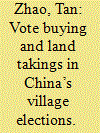|
|
|
Sort Order |
|
|
|
Items / Page
|
|
|
|
|
|
|
| Srl | Item |
| 1 |
ID:
183801


|
|
|
|
|
| Summary/Abstract |
This study explores how the Chinese local state uses corruption as an informal institution to elicit compliance from village cadres. While serving as the state's key agents for governing the countryside, village cadres differ from other state agents in several ways, including that they are democratically elected, they do not have promotion opportunities, and they receive a low official salary. In this context, I argue that the local state has utilized corruption to incentivize and mobilize village cadres to follow its directives. Based on fieldwork conducted in nine villages located in three different provinces, I find that the local state would allow village cadres to engage in corruption as a reward as long as they can accomplish their state tasks. However, if village cadres fail to accomplish those state tasks, the local state would punish them by limiting their access to corruption opportunities or even threatening to charge them with economic crimes. Moreover, I find that the existence of formal institution, especially the cadre evaluation system and village elections, greatly help limit the magnitude of corruption by village cadres and make this informal institution sustainable. Given that exerting effective control over local agents is crucial for governance, the fact that the regime is able to keep its vast number of village cadres in line at a low cost has contributed to the durability of its rule.
|
|
|
|
|
|
|
|
|
|
|
|
|
|
|
|
| 2 |
ID:
190382


|
|
|
|
|
| Summary/Abstract |
Many researchers attribute the Chinese regime’s strong state capacity and resilience to its ability to control its local agents. Less well known, however, is how the state manages to secure compliance from village cadres—rural community leaders who are not state officials but who are directly elected by villagers. This essay explores and assesses how the state has attempted to expand its control over village cadres through a process of top-down “professionalization.” Using a county case study, I demonstrate that the professionalization of village cadres has taken place across four key dimensions: (1) cadre salary, (2) evaluation criteria, (3) office structure, and (4) training workshops. I argue that through the process of professionalization, village cadres have increasingly come to resemble state officials. However, professionalization has been only partially successful in increasing village cadres’ compliance with the state. Most critically, these reforms have failed to establish an adequate reward mechanism for village cadres, who have no opportunity for promotion and are poorly paid. As a result, the state’s ability to control and mobilize village cadres has not significantly improved.
|
|
|
|
|
|
|
|
|
|
|
|
|
|
|
|
| 3 |
ID:
158038


|
|
|
|
|
| Summary/Abstract |
Why has vote buying spread so rapidly in China’s village elections in recent years? Based on fieldwork conducted in 14 villages of Shandong Province, this article argues that candidates pursue vote buying when they perceive large potential economic rents associated with the village leader’s power. While such rents were relatively limited in the past, the introduction of land takings in rural areas has significantly changed this situation and sharply increased potential rents for candidates, thus providing them with stronger incentives to pursue vote buying. In other words, this article associates vote buying with rent seeking in China’s village elections.
|
|
|
|
|
|
|
|
|
|
|
|
|
|
|
|
|
|
|
|
|